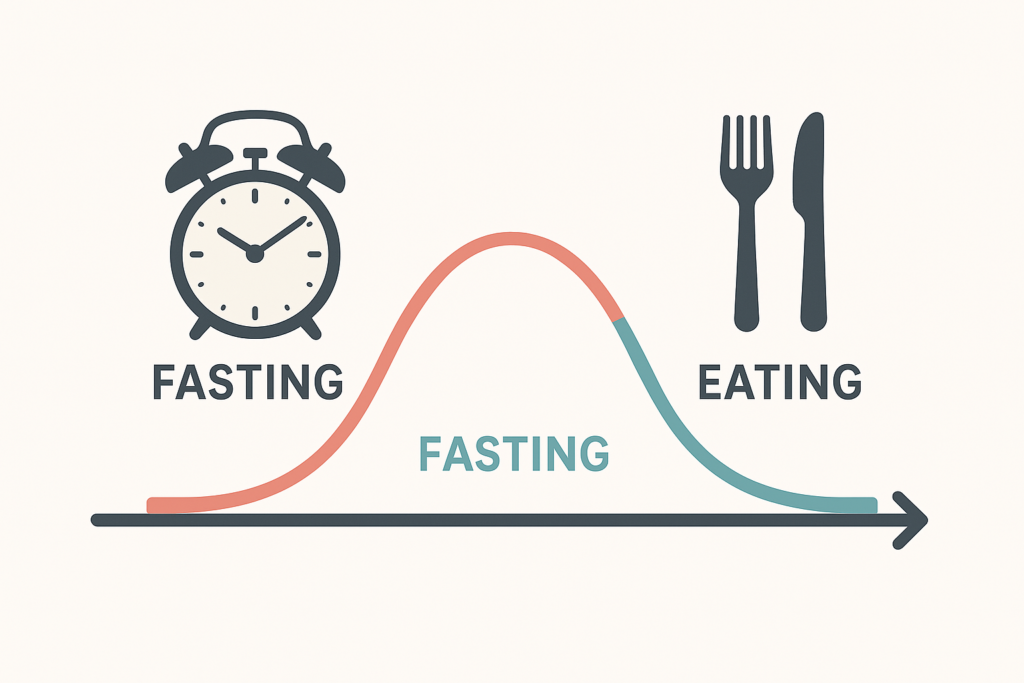This article explores the science-backed benefits of intermittent fasting for longevity, highlighting how fasting supports cellular repair, metabolic health, hormonal balance, and inflammation reduction. It breaks down various fasting methods, such as the 16/8, 5:2, alternate-day fasting, and 24-hour fasts, while offering practical tips on how to start safely. With insights into autophagy, insulin sensitivity, and oxidative stress, this guide explains how intermittent fasting can enhance overall well-being and extend a healthy lifespan.

Understanding Intermittent Fasting
What Is Intermittent Fasting?
Intermittent fasting (IF) is an eating pattern that alternates between periods of fasting and eating. Unlike traditional diets that focus solely on what to eat, IF emphasizes when to eat. This method leverages the body’s natural ability to regulate metabolism and optimize energy use over specific time frames.
Instead of constantly digesting food, the body enters a fasting state where it shifts toward burning stored fat for energy. Research suggests that fasting triggers biological processes that may extend lifespan, improve metabolic health, and enhance overall well-being. Many experts believe that controlled fasting helps regulate essential hormones while promoting optimal cellular function.
The Science Behind Fasting and Longevity
Scientific studies highlight that intermittent fasting influences key longevity pathways. When the body enters a fasted state, cellular repair mechanisms activate, allowing cells to remove accumulated waste. This self-cleaning process, known as autophagy, plays a crucial role in reducing the risk of chronic diseases and age-related deterioration.
During fasting, insulin levels drop, enabling fat cells to release stored energy. At the same time, increased human growth hormone (HGH) levels support tissue repair and muscle preservation. These metabolic changes help enhance longevity by minimizing oxidative stress, reducing inflammation, and improving overall health. As the body adapts to fasting, mitochondrial function improves, leading to better energy production and more efficient cellular repair mechanisms.
Benefits of Intermittent Fasting for Longevity
Cellular Repair and Autophagy
During fasting, the body shifts its focus from growth to maintenance and repair. Autophagy eliminates dysfunctional or damaged cells, preventing them from accumulating and contributing to age-related disorders such as Alzheimer’s and Parkinson’s disease. By removing toxic cellular waste, the body preserves optimal function and reduces the risk of degenerative conditions.
Additionally, autophagy helps regenerate new, healthier cells, supporting overall organ function. This natural cleaning process becomes more efficient as fasting duration increases, enhancing tissue health and improving immune system efficiency. Studies indicate that fasting-induced autophagy plays a pivotal role in promoting longevity and reducing cellular wear and tear over time.
Metabolic Health and Longevity
Intermittent fasting enhances insulin sensitivity, making it easier for the body to regulate blood sugar levels. As a result, IF reduces the risk of type 2 diabetes, a condition closely linked to premature aging and chronic inflammation. By stabilizing glucose metabolism, fasting prevents metabolic imbalances that can accelerate the aging process.
Furthermore, fasting helps regulate cholesterol levels by promoting the breakdown of harmful fats. The improved lipid profile resulting from intermittent fasting supports cardiovascular health, reducing the risk of heart disease, which is a leading cause of age-related mortality. Enhanced metabolic flexibility enables the body to efficiently switch between burning glucose and fat for energy, a key factor in sustained longevity.
Hormonal Balance and Growth Hormone Production
Fasting promotes the secretion of human growth hormone (HGH), a vital component in muscle preservation, fat metabolism, and overall cellular health. Elevated HGH levels contribute to lean muscle maintenance, increased fat oxidation, and enhanced physical performance.
Higher HGH levels not only support longevity but also assist in tissue regeneration. This natural boost in growth hormone plays a crucial role in maintaining bone density, improving skin elasticity, and promoting muscle repair. The hormonal balance achieved through fasting helps slow down age-related muscle loss and supports long-term health and vitality.
Reduced Inflammation and Oxidative Stress
Chronic inflammation and oxidative stress are major contributors to the aging process. Uncontrolled inflammation damages cells, accelerates tissue deterioration, and increases the risk of chronic diseases. Fasting has been shown to reduce inflammation markers, promoting overall health and reducing the burden of oxidative damage.
Additionally, intermittent fasting enhances antioxidant defense systems, helping the body combat free radicals responsible for premature aging. By lowering inflammation levels, fasting provides long-term protection against age-related conditions such as arthritis, neurodegenerative diseases, and cardiovascular disorders.
Popular Intermittent Fasting Methods

The 16/8 Method
This approach involves fasting for 16 hours and eating within an 8-hour window. Many find this method sustainable as it aligns with natural circadian rhythms. It allows the body sufficient time to burn stored fat while still providing an ample eating window to meet daily nutritional needs.
The 16/8 method is one of the most accessible fasting strategies, making it an excellent choice for beginners. It enables individuals to gradually adapt to longer fasting periods while maintaining a structured meal plan. This method supports steady energy levels throughout the day and minimizes the risk of overeating during eating windows.
The 5:2 Method
In this plan, normal eating occurs five days a week, while calorie intake is significantly reduced on two non-consecutive days. This method can improve metabolic health without drastic dietary changes. By strategically reducing calorie consumption, individuals can still enjoy the benefits of fasting without full daily restrictions.
The 5:2 method offers a flexible approach to intermittent fasting, allowing individuals to maintain a balanced lifestyle. On fasting days, consuming nutrient-dense, low-calorie foods can help sustain energy levels while promoting fat loss and cellular repair. This method is ideal for those who prefer periodic fasting rather than daily time-restricted eating.
Alternate-Day Fasting
This strategy alternates between fasting days and regular eating days. Some versions allow small meals on fasting days, making it more flexible than complete fasting. It promotes significant metabolic improvements while providing opportunities for nutrient replenishment on non-fasting days.
Alternate-day fasting is highly effective for weight management and long-term health. Studies suggest that this method enhances cardiovascular function, reduces blood pressure, and improves lipid metabolism. It offers a balance between fasting benefits and sustainable dietary patterns, making it a powerful tool for longevity.
The 24-Hour Intermittent Fasting
Also called the Eat-Stop-Eat method, this protocol involves fasting for a full 24 hours once or twice a week. This method provides an extended period for deep cellular repair and autophagy activation.
A 24-hour fast allows the body to fully deplete glycogen stores, triggering significant fat oxidation. While it may be challenging initially, this fasting approach strengthens mental discipline, enhances gut health, and improves metabolic efficiency over time.
How to Start Intermittent Fasting Safely
Adjusting Gradually
Jumping straight into long fasting periods can be challenging. Gradually increasing fasting durations allows the body to adapt without overwhelming hunger or fatigue.
For beginners, starting with a 12-hour fasting window before progressing to longer fasts is recommended. This approach ensures a smoother transition while minimizing side effects like dizziness or irritability.
Staying Hydrated
Water, herbal teas, and black coffee can be consumed during fasting periods. Hydration supports metabolism and prevents common fasting-related symptoms such as headaches or fatigue.
Adequate fluid intake is essential for maintaining electrolyte balance and preventing dehydration. Adding a pinch of sea salt to water can help replenish essential minerals and improve hydration efficiency during fasting periods.
Choosing Nutrient-Dense Foods
Breaking a fast with highly processed or sugary foods can spike insulin levels, negating fasting benefits. Instead, prioritizing protein, healthy fats, and fiber-rich vegetables ensures sustained energy and stable blood sugar levels.
Including whole foods like lean proteins, avocado, nuts, and leafy greens supports overall health and enhances fasting benefits. Proper nutrition during eating windows maximizes the body’s ability to repair and function optimally.
Conclusion
Intermittent fasting offers a promising approach to longevity and overall health. By promoting cellular repair, improving metabolic functions, and reducing inflammation, IF aligns with natural biological processes that support a longer, healthier life. While fasting may not suit everyone, those who incorporate it wisely into their lifestyle can reap significant benefits.
As research continues to unfold, intermittent fasting remains one of the most effective and natural ways to enhance lifespan and well-being. With proper implementation, consistency, and a balanced approach, intermittent fasting can serve as a powerful tool for maintaining vitality and extending healthy life expectancy.
